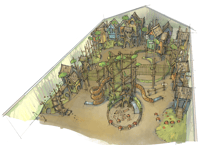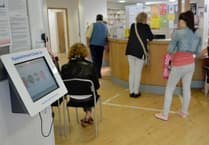ALTON Community Hospital is to keep its full complement of beds.
The reprieve has been brought about by the government's 10-year plan to improve the NHS which places greater emphasis on intermediate care in the community.
Welcoming the fact that, under the new proposals, "Alton Community Hospital is likely to be more of a community hospital than it has been in recent times," Alton GP Dr Philip Hopwood stressed that nobody had wanted the beds closed but, until recently, North and Mid Hampshire Health Authority (NMHHA) finances had dictated that they should be.
As previously reported by The Herald, the board of the NMHHA decided in October last year to axe eight beds at Alton Community Hospital and nine at Chase Hospital, Bordon, as part of a cost-cutting exercise to claw back the £10 million deficit in health authority coffers.
Used until recently for the treatment of elderly, mentally infirm (EMI) patients, the beds were to be relocated elsewhere in the county, possibly at Basingstoke.
Alton Community Hospital currently has 48 beds but the health authority was arguing that the eight beds designated for EMI patients were not in the right location as they were not being used by patients from the local area.
Analysis by the NMHHA showed they were occupied by patients who lived in Basingstoke or further afield.
According to Community Health Council chief officer, Chris Marsh, the beds were kept open over the winter period in order to relieve provision at the North Hampshire Hospital.
"They were used for local people no longer requiring acute care," she said.
News that the beds are to be saved comes as the newly formed GP-led North Hampshire Primary Care Trust (NHPCT) takes over the role of providing health care both at Alton Community Hospital and at The Chase.
NHPCT chief executive, Gill Duncan, explained that while discussion had revolved around whether it was viable to take the Alton beds out of the system, government investigations, and in particular the "national beds'" inquiry, had revealed the need for an increase in intermediate-care beds.
"We still need to make savings but not through bed closures," said Mrs Duncan.
She stressed that the emphasis was rather on more efficient use of beds at North Hampshire Hospital.
"The idea is that those no longer requiring acute care, but unable to return home, should make use of beds provided at local community hospitals, which in turn will help to reduce waiting lists," she said.
Finance remains "one of the big challenges". According to Gill Duncan, while the government has been putting "new" money into the health service, any funding received locally is weighted.
Based on "perceived need", the NMHHA and the NHPCT only receive funding for 80 per cent of residents. But, while funding is capped, local demand does not decrease by 20 per cent, leaving a gap which is difficult to bridge.
"The aim is to provide more health care with the money available," said Mrs Duncan . She points out that a general reduction in the south east region in nursing and residential home beds has further sought to highlight the need for the retention of community beds.
As Alton Health Centre's representative on the NHPCT, Philip Hopwood, acknowledges the fact that the southern region gets paid less per head to provide health care than more deprived areas of the country which, he admits, "will have a major bearing on what we can do."
Nonetheless he is delighted with Alton's reprieve.
"All ideas at the moment are revolving around care in the community rather than providing more acute beds, which I believe is the right way to go. It is the most logical place for this type of care," he told The Herald.
Dr Hopwood feels the PCT will ensure greater use of the community hospital, resulting in a better resource for the town.
"In the past local GPs have had access to just a quarter of the beds but as intermediate care takes off, we will need more. This should result in fewer consultant-led patients and more local people using the beds."
But, he warns, intermediate care does not come pre-packaged.
"More discussion has to take place on how this is going to work and who is going to do it - we will for example need more therapists and physiotherapists and at the end of the day, finance will dictate what we can and can't do with the beds.
"But one thing is sure, with the PCT taking over responsibility for Alton Community Hospital and The Chase and with good local representation, we will be more responsive to local need," assured Dr Hopwood. He added: "It is a nice feeling that what we have got we are going to keep!"


